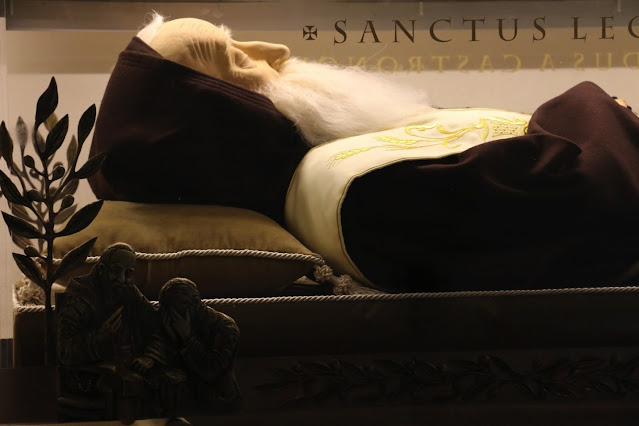10161983 homily of John Paul II canonization Leopold Mandic
Leopoldo Mandic, in his days, was a heroic servant of reconciliation and penance.
Born in Castelnovo, together with "Bocche di Càttaro", at the age of 16 he left his family and his land to enter the Capuchin seminary of Udine. In his life there are no great events; some transfer from one convent to another, as is customary among the Capuchins, and nothing more. And later, the assignment to the convent of Padua, where he remained until his death.
Well then, precisely on this poverty of a life without external importance, the Holy Spirit came and lit up a new greatness, that of a heroic fidelity to Christ, to the Franciscan ideal and to the priestly service to the brothers.
Saint Leopold did not leave theological or literary works, he did not dazzle with his culture nor did he found social works. To those who knew him, he was just a poor, sickly little friar.
His greatness consisted in something else, in immolating himself and giving himself day by day throughout his priestly life, that is, 52 years, in the silence, intimacy and humility of a confessional cell: «The good shepherd gives his life for the sheep». Fray Leopoldo was always there, available and smiling, prudent and modest, discreet confidant and faithful father of souls, respectful teacher and spiritual adviser, understanding and patient.
If we want to define him with a word, as his penitents and brothers used to do in life, then he is "the confessor"; he only knew how to "confess." And precisely in this lies its greatness. Knowing how to disappear to give way to the true Shepherd of souls. He used to define his mission as follows: «Let us hide everything, even what may seem like a gift from God; lest it be manipulated. Only to God honor and glory! If it were possible, we should pass through the earth like a shadow that leaves no trace of itself. And to someone who asked him how he resisted such a life, he replied: "It's my life!"
"The good shepherd lays down his life for the sheep." To human eyes, the life of our Saint resembles a tree from which an invisible and cruel hand has cut off all the branches one after another. Father Leopoldo was a priest unable to preach due to a pronunciation defect. A priest who longed to dedicate himself to the missions, and until the end he waited for the day to leave, which did not come because his health was very weak. A priest with such a great ecumenical spirit that he offered himself with daily dedication as a victim to the Lord so that full unity could be restored between the Latin Church and the Eastern ones, still separated, and there would once again be "one flock under one shepherd" (cf. John 10:16); but he lived his ecumenical vocation in total concealment. Between tears he said: «I will be a missionary here, in obedience and in the exercise of my ministry». And also: "Every soul that claims my ministry will meanwhile be my East."
What did Saint Leopold have left? Who and what was his life for? He was left with the brothers and sisters who had lost God, love and hope. Poor human beings who needed God and came to him asking for forgiveness, consolation, peace and serenity. Saint Leopold gave his life to these “poor”, for them he offered suffering and prayer; but with them above all he celebrated the sacrament of reconciliation. Here lived his charisma. Here his virtues found heroic expression. He celebrated the sacrament of reconciliation and exercised the ministry as in the shadow of the crucified Christ. His eyes fixed on the crucifix hanging on the penitent's prie-dieu. The protagonist was always the Crucified. "He is the one who forgives, He is the one who absolves." He, the Shepherd of the flock...
Saint Leopold sank his ministry in prayer and contemplation. He was a confessor of continuous prayer, a confessor who habitually lived absorbed in God, in a supernatural atmosphere.
The first reading of today's liturgy reminds us of Moses' prayer of intercession during a battle that Israel fought against Amalek. When Moses' hands were raised, the scales of victory tipped toward his people; when these hands fainted from weariness, Amalek ruled.
The Church, by putting before her eyes today the figure of her humble servant Saint Leopold, who was a guide for many souls, wishes to point out to us the hands that are raised upwards in the various struggles of man and of the People of God, which are raised in prayer and rise up in the act of absolution from sins, absolution that always comes to the love that is God, the love that was revealed to us once for all in Christ crucified and risen.
"Through Christ we beseech you: be reconciled to God" (2 Cor 5:20).
What do these hands of Moses raised in prayer tell us, beloved brothers? What do the hands of Saint Leopold, humble servant of the confessional, tell us? They tell us that the Church can never get tired of bearing witness to God, who is love. It can never be discouraged or weary in the face of setbacks, since the summit of this testimony rises indomitable in the cross of Jesus Christ over the entire history of man and of the world.
This image is a public domain image, which means either that copyright has expired in the image or the copyright holder has waived their copyright. Franciscan Gallery charges for the access to high resolution copy of the image. Manually restoration was necessary in order to improve quality, without covering the original image.






Comments
Post a Comment